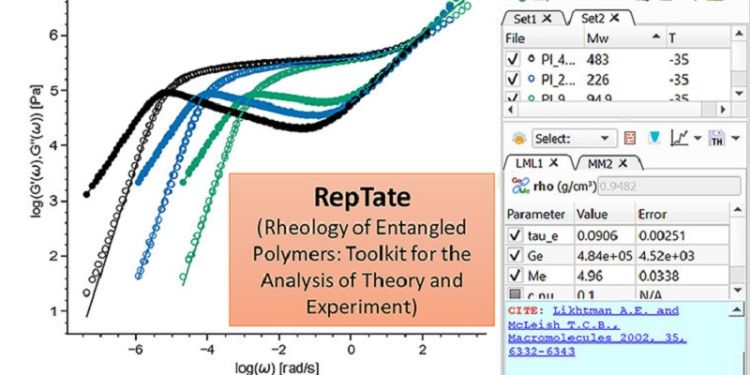Updated software platform simplifies testing rheological theories

A new, open-source version of a software package for sharing rheological data has been developed by researchers at the School of Mathematics.
RepTate (Rheology of Entangled Polymers: Toolkit for Analysis of Theory and Experiment) is a platform that enables exchange of experimental information, and comparison to state-of-the-art theories, for researchers and students of rheology. This is the branch of physics concerning the deformation and flow of matter – a vital concept in engineering new polymers and other materials.
It contains both modern and classical theories of polymer dynamics, and even allows users to add new theories with a few lines of code.
While the original RepTate was published over a decade ago, this new version was built in Python, meaning it works across Windows, Mac and Linux operating systems, opening the platform up to many more users. RepTate is a flexible, user-friendly platform which can be installed on the same computer that runs experiments, making the data analysis workflow more convenient.
The updated software was a collaboration between Professor of Soft Matter Daniel Read, his former PhD student Dr Victor Boudara, and Dr Jorge Ramirez of the Polytechnic University of Madrid’s Department of Chemical Engineering.
“With just a few clicks, users can load their experimental data, represent them in a convenient way and compare them with several different theories,” said Dr Ramirez. “At the same time, we have tried to make the software flexible enough so that advanced users can have full control over how they fit theories to data.”
The updated software’s release was chosen as one of the American Institute of Physics’s Scilights, a series showcasing new and groundbreaking research.
Find out more about the software and download it here: https://reptate.readthedocs.io/
Further reading
“Software developed to make rheological information easy to exchange”, AIP Scilight
REPTATE rheology software: Toolkit for the analysis of theories and experiments, Victor A. H. Boudara, Daniel J. Read, Jorge Ramirez, Journal of Rheology April 2020




